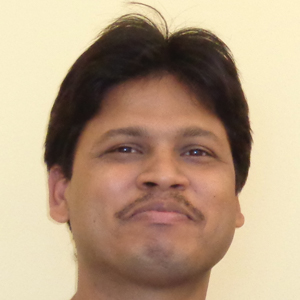Wish I did my Ph.D. in the U.S.
With an offer letter in my hand from one of the most prestigious education and research institutions in India, the Indian Institute of Technology Kharagpur, I was excited. But the prospect of getting a doctorate degree from India also gave me the feeling of settling for less. That feeling was bolstered further when I arrived in the U.S. as a postdoctoral researcher.

The offer from IIT Kharagpur was enviable, at least to my fellow botanists, friends and family. I had a master’s degree from a top-notch university, but as it was a state institution, it didn’t have the same clout as IIT Kharagpur. My admission interview went nearly perfectly. My written examination scores were nice and strong. I had secured fellowships to support my research in plant biotechnology for more than five years. But I had to work with limited laboratory resources. I now realize why I had the feeling of settling for less: I didn’t do my Ph.D. in the most perfect place!
I’m comparing my experiences to what I see American students go through. I am startled by the amount of resources and technologies available to them. I feel that I did not get any of the things American graduate students get, such as access to resources, acquisition of skills, development of scientific street-smarts, opportunities to attend quality workshops and symposia, teaching experiences, and so on.
I feel I arrived late to many things they take for granted. I feel I have a lot to learn and assimilate.
For example, during class lectures in the U.S., I saw research manuscripts from journals, like Nature, the Journal of Biological Chemistry and Science, in the hands of undergraduate students. I did not have any access to any of those journals back in India. I hadn’t even heard their names until toward the end of my master’s degree! All I had were textbooks and the Machiavellian system of Indian education. In that system, I had to memorize passages prescribed in the syllabus, write a final exam at the end of one or two years, and come out with flying colors. I was completely unaware of the journals in which the research on which these textbooks were based was first reported! Seeing these undergraduates reading research articles, understanding them, summarizing the findings and writing reports astonished me. The college system was geared toward learning about research firsthand.
Another incident drove home how different my education was. During a postdoctoral stint at the University of Florida, Gainesville, my principal investigator got many applications from undergraduate students to do research for a few months. Much to my bewilderment, I was offered an undergraduate research assistant. I mentioned my confusion to my PI. I couldn’t understand how an undergraduate could be allowed to work on a project funded by the National Science Foundation by my side. Back in India, I was not allowed to touch an autoclave until I started my master’s degree, and I definitely was not allowed to touch a mass spectrometer at a core facility during my Ph.D.! I was surprised that an undergraduate student was getting the same opportunity on a project as me, who already had a Ph.D.
I realized two things. The first thing was that in the American academic system everyone has a right to learn. The second thing was that a Ph.D. isn’t a prerequisite to do serious research. I looked at undergraduates and, for that matter, lab managers and technicians with fresh eyes. They were immensely talented, highly successful and contributing in significant ways to the progress of science.
I wish I had done my Ph.D. at a top-notch school in the U.S. or the European Union. I probably would have been way ahead of where I am now. But the one thing I don’t regret about my Ph.D. is the mental and emotional strength I received by doing it. I survived my Ph.D. “catastrophe” because my PI was immensely supportive. I was strong to endure that five-year period of pain and train myself to secure an academic career in genomics and metabolomics. A faculty member at the university where I did my master’s degree once suggested that I go for another “good” doctorate degree in Germany or the U.S. But I politely declined. A Ph.D. is not worth doing twice!
Enjoy reading ASBMB Today?
Become a member to receive the print edition four times a year and the digital edition monthly.
Learn moreGet the latest from ASBMB Today
Enter your email address, and we’ll send you a weekly email with recent articles, interviews and more.
Latest in Opinions
Opinions highlights or most popular articles

Women’s health cannot leave rare diseases behind
A physician living with lymphangioleiomyomatosis and a basic scientist explain why patient-driven, trial-ready research is essential to turning momentum into meaningful progress.

Making my spicy brain work for me
Researcher Reid Blanchett reflects on her journey navigating mental health struggles through graduate school. She found a new path in bioinformatics, proving that science can be flexible, forgiving and full of second chances.

The tortoise wins: How slowing down saved my Ph.D.
Graduate student Amy Bounds reflects on how slowing down in the lab not only improved her relationship with work but also made her a more productive scientist.

How pediatric cataracts shaped my scientific journey
Undergraduate student Grace Jones shares how she transformed her childhood cataract diagnosis into a scientific purpose. She explores how biochemistry can bring a clearer vision to others, and how personal history can shape discovery.

Debugging my code and teaching with ChatGPT
AI tools like ChatGPT have changed the way an assistant professor teaches and does research. But, he asserts that real growth still comes from struggle, and educators must help students use AI wisely — as scaffolds, not shortcuts.

AI in the lab: The power of smarter questions
An assistant professor discusses AI's evolution from a buzzword to a trusted research partner. It helps streamline reviews, troubleshoot code, save time and spark ideas, but its success relies on combining AI with expertise and critical thinking.

